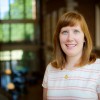This article is more than 5 years old.
It was a whirlwind Society of NC Archivists meeting for me this year due to my responsibilities as Education Committee chair. In addition to organizing three workshops for SNCA’s traditional pre-conference workshop day and presenting one of our Education awards, I was also a member of the conference program committee.
SNCA Education offered three workshops that were all full or nearly full by workshop day: Social Media Archiving, as Craig described; a Society of American Archivists course, Privacy and Confidentiality Issues in Digital Archives, which Rebecca was able to attend; and a course on Descriptive Cataloging of Rare Materials (Manuscripts), also known as DCRM(MSS), a standard that provides guidance on cataloguing individual manuscripts. Easily the worst part about coordinating the workshops was not being able to attend any, as they are all relevant to my work as Collections Archivist! With much help from Duke’s Rubenstein Library staff (including folks not involved with SNCA), attendees had a very smooth day of learning. I am already brainstorming workshops for next year as well as how to provide remote options for folks who cannot make it to conference sites.
As for the conference itself, it was wonderful! The conference theme was “Navigating the Web of Community: Archivists and the Ethics of Care,” based on Caswell and Cifor’s article “From Human Rights to Feminist Ethics: Radical Empathy in the Archives,” Archivaria, vol. 82, 23-43 (which I also mentioned in my SAA17 round-up). The sessions did an amazing job of aiming their topics at various aspects of the relationship of us archivists to record creators, records subjects, users, and communities, as well as that fifth relationship proposed at SAA, to each other. I enjoyed all the presentations that I was able to attend, but two that stuck with me were:
- “Providing an Australian Perspective on Emotional Labour and Archival Practice” from two Aussie visitors, Michaela Hart and Nicola Laurent, who discussed the effects of vicarious trauma that they experienced and had to manage while working with records related to child abuse. Their openness about the difficult experience with record seekers and how they received support was really moving. I wondered how I provide support to colleagues working on challenging collections or even broader issues like climate change. I was also prompted to think about describing archival collections and items, as we do in finding aids or individual digital collection items, with methods that would not (re-)traumatize information seekers of all kinds. Working with university photograph metadata has made me sensitive to the assumptions and weight of words that go into describing even the most straightforward of images; how much more complicated would records with content as described by Michaela and Nicola be.
- “One History Cannot Be Complete Without the Other: Giving Back the Voices of Western North Carolina Tomorrow Black Oral History Project” from Western Carolina University’s Liz Skene. Liz also spoke candidly about the Western North Carolina Tomorrow Black Oral History Project, an important collection of black Appalachian voices and perspectives that had languished from lack of funding and personnel over time. She detailed various custodians of the collection that had tried to release, or stymied, the project audio, and how rediscovering long-sought permissions forms and applying student labor allowed her to begin providing access to more than two-thirds of these interviews, restricted for so long. Her work brings into sharp relief that record collecting, appraisal, processing, and stewardship are all important parts of maintaining an inclusive historical record, and that lack of funding or staffing can directly harm that record. And her care for this documentation of western Carolinians, as an act of service to all involved in the project over the years, was touching in a way that I’m not sure I can explain.
All in all, the conference involved a great deal of labor from many folks, especially Program Chair and President-elect of SNCA, Kelly Wooten of Rubenstein’s Sallie Bingham Center for Women’s History and Culture, but seemed to be a hit! I came out with many ideas for the Education Committee’s efforts across the next year, especially oriented around the concept of radical empathy. Now all I have to do is start sending emails…

8 Comments on ‘Stephanie at SNCA 2018’
Thanks for sharing — always enjoy hearing about SNCA!
Even though I was only at SNCA for one day, I was impressed with the organization of the conference. congrats to all who participated in this great conference.
This conference always sounds wonderful! So I’m not surprised to hear you play an important role in making it that way 🙂
The session about emotional labor and records sounds really informative and unique. Great job highlighting a different, but important, perspective of the profession.
Hooray for a successful SNCA! Sounds like you had lots of great session topics.
Well done, Stephanie! I enjoyed the workshop I attended.
Conference planning is seriously hard work! Congrats! This sounds like it was an amazing experience for your attendees!
Congrats on a successful conference!